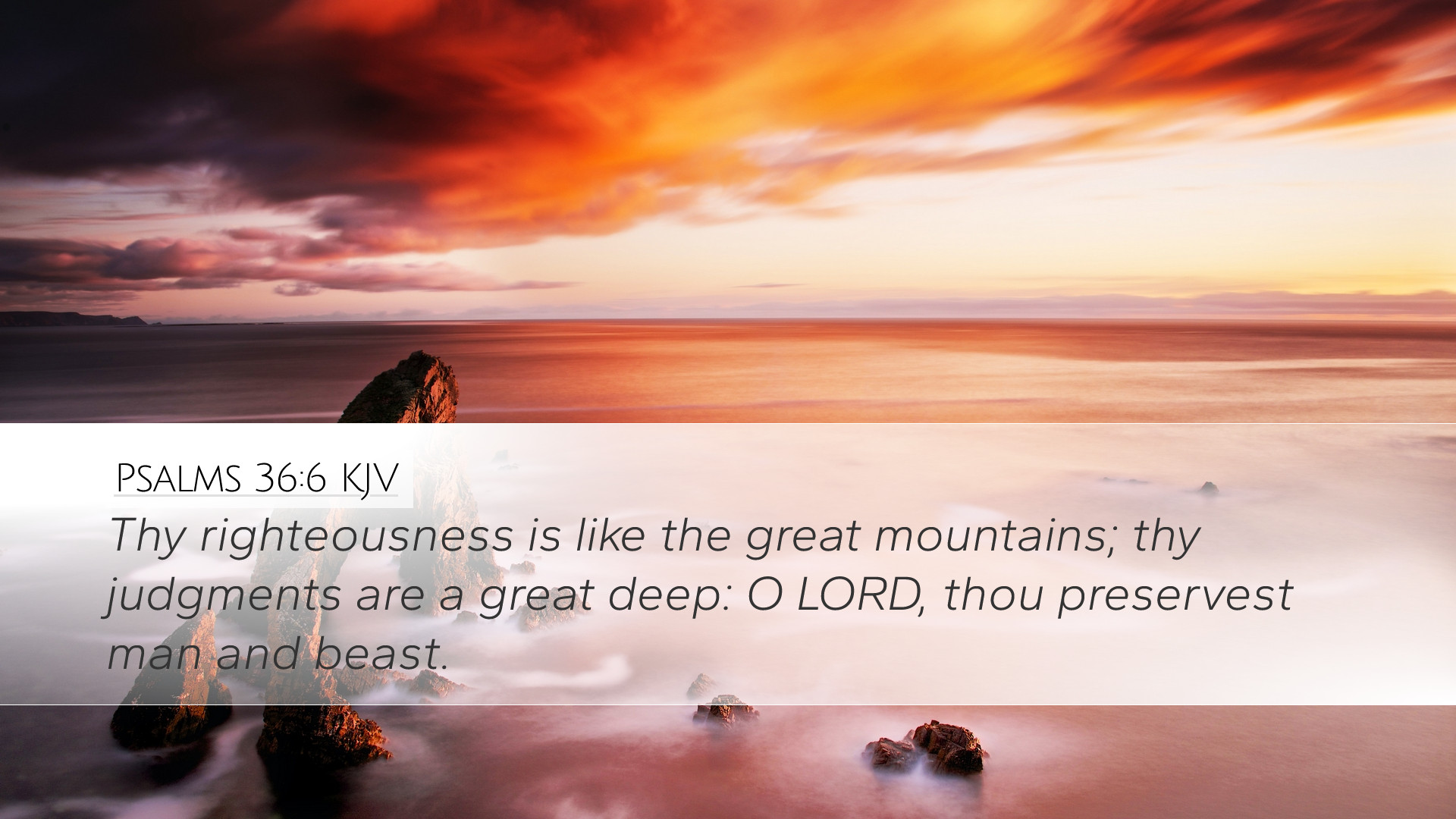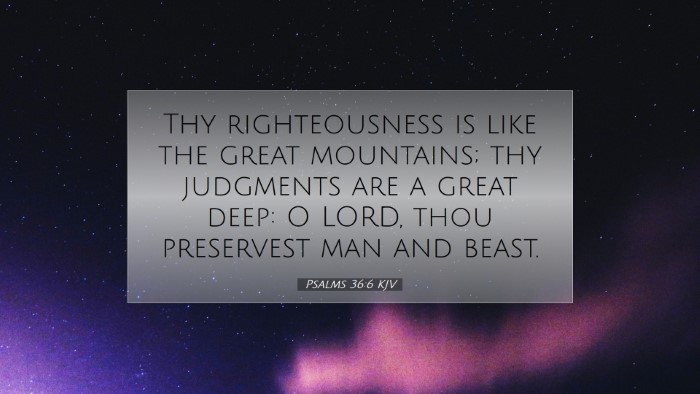Psalms 36:6 - Commentary Summary
Verse Text: "Thy righteousness is like the great mountains; thy judgments are a great deep: O Lord, thou preservest man and beast."
Introduction
This verse from Psalm 36 captures the essence of God's righteousness and justice in striking metaphors. The psalmist expresses the grandeur of God's attributes in a way that resonates deeply with believers. In this commentary, we will explore various insights from esteemed public domain commentaries such as those by Matthew Henry, Albert Barnes, and Adam Clarke.
Exegesis and Context
Psalms 36 is attributed to a contemplative mind, reflecting on the contrast between the wickedness of humanity and the boundless goodness of God. The psalmist presents a view of God’s character that stands in stark opposition to human sinfulness.
Righteousness and Its Comparisons
Matthew Henry elucidates that the metaphor of righteousness being likened to "the great mountains" signifies its unshakeable nature. Just as mountains are a symbol of stability and permanence, so is God's righteousness immutable and eternal.
Albert Barnes emphasizes that mountains in biblical times represented strength and grandeur. Thus, God's righteousness is not only stable but also majestic, surpassing all human standards of justice and moral rectitude.
The Depths of God's Judgments
The second part of the verse, "thy judgments are a great deep," conveys the idea of God's judgments being profound and unfathomable. Adam Clarke suggests that the "great deep" refers to the vastness of God's knowledge and the inscrutability of His ways. Just as the depths of the ocean are beyond human exploration, so too are God's judgments often beyond human comprehension.
Matthew Henry reinforces this by stating that God's judgments are comprehensive and inclusive of all aspects of His creation. They encompass both mercy and justice, reflecting the complex nature of divine governance.
Theological Implications
This verse carries significant theological weight, illustrating key attributes of God. The imagery used is not simply poetic but conveys deep truths about God's nature and His dealings with creation.
The Preservative Nature of God
At the close of the verse, the psalmist declares, "O Lord, thou preservest man and beast." This highlights God's role as the sustainer of life. Albert Barnes argues that this divine preservation extends to all creation, indicating God's care and providence. It suggests that every creature, from the smallest insect to the largest mammal, is under the watchful eye of the Creator.
Matthew Henry further emphasizes that this preservation is an act of grace. It is a reminder of God's mercy that allows life to flourish despite the presence of sin. God's willingness to sustain beings who often rebel against Him reveals the depths of His love and compassion.
Contrast with Human Sinfulness
The juxtaposition of God's righteousness and judgments with human sinfulness cannot be overlooked. The preceding verses of Psalm 36 outline the depravity of man, making God's attributes even more striking against the dark backdrop of sin. Adam Clarke posits that an awareness of our own unworthiness should lead us to a deeper appreciation of God's righteousness.
In understanding this contrast, the faithful are reminded of their dependence on God's grace and mercy. In a world filled with moral ambiguity and wickedness, recognizing God’s righteous standards serves as both a comfort and a challenge for believers.
Application for Believers
As we reflect on Psalms 36:6, several applications can be drawn for pastors, students, theologians, and Bible scholars:
- Embrace God's Righteousness: Acknowledge the immutability of God’s righteousness as a standard for personal conduct and communal ethics.
- Seek Understanding of God's Judgments: Strive to seek wisdom and understanding of the deep judgments of God, recognizing that they may often transcend human reasoning.
- Trust in Divine Preservation: Find comfort in the assurance that God preserves all creation, motivating us to protect and care for it as well.
- Recognize Our Dependence: Foster a sense of humility in light of human sinfulness, engaging in repentance and gratitude for the grace extended through Christ.
Conclusion
Psalms 36:6 beautifully encapsulates the balance of God’s attributes—His righteousness, the profundity of His judgments, and His providential care for all living beings. As believers meditate on this passage, they are invited to acknowledge the greatness of God while being reminded of their own need for His grace and mercy. This understanding paves the way for a more profound reverence and relationship with the Creator, inspiring deeper study and reflection among theologians, pastors, and students alike.


